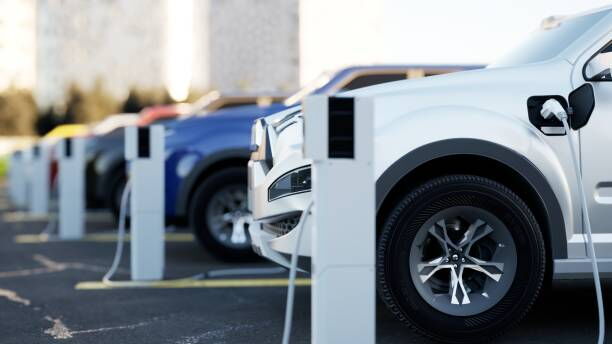The California Type Evaluation Program (CTEP), administered by the California Department of Food and Agriculture’s Division of Measurement Standards (DMS), is a critical certification program designed to ensure the accuracy, safety, and reliability of weighing and measuring devices. Established to prevent fraud and the sale of faulty or unsafe equipment, CTEP plays a vital role in maintaining consumer trust and market integrity. In January 2020, CTEP expanded its scope to include commercial electric vehicle (EV) chargers manufactured or installed in California. This move underscores the growing importance of EV charging infrastructure and the need for standardized, safe, and fair practices in the rapidly evolving EV industry.

The global electric vehicle market is experiencing unprecedented growth, driven by increasing environmental awareness, government incentives, and advancements in EV technology. As a result, the demand for reliable and accessible EV charging infrastructure has surged. However, the lack of standardization and compatibility among charging equipment poses significant challenges to the industry. Issues such as inaccurate energy measurement, inconsistent payment systems, and safety concerns have highlighted the need for robust regulatory oversight.
CTEP compliance ensures that commercial EV chargers meet stringent safety and performance standards, providing EV drivers with a consistent and reliable charging experience. By certifying that chargers are designed for their intended use, operate correctly, and display accurate measurements, CTEP helps prevent fraud, protect consumers, and promote fair competition in the market.
The CTEP certification process for commercial EV chargers is a comprehensive and structured procedure designed to evaluate and verify compliance with program requirements. Here’s a step-by-step guide to the process:
Manufacturers or operators must begin by filling out a Certificate of Approval (COA) application online and paying a non-refundable application fee of $500. This initiates the certification process and signals the manufacturer’s commitment to compliance.
Once the application is submitted, the manufacturer works closely with a CTEP evaluator to ensure that their EV chargers meet all program requirements. This includes reviewing design specifications, operational functionality, and safety features.
The manufacturer is required to pay an evaluation fee, which covers the cost of the evaluator’s services, equipment, travel, and per diem expenses. This fee ensures that the evaluation process is thorough and unbiased.
The CTEP evaluator conducts an on-site assessment of the EV chargers, recording observations and taking photographs to document the evaluation process. These records are attached to the COA document and serve as evidence of compliance.
If the Division of Measurement Standards (DMS) approves the evaluation results, the manufacturer receives their Certificate of Approval (COA) by mail. This certification confirms that the EV chargers meet CTEP requirements and are eligible for sale or installation in California.
The COA is added to the DMS COA database, making it publicly accessible and providing transparency for consumers, regulators, and industry stakeholders.
The inclusion of commercial EV chargers under CTEP regulations reflects the growing recognition of EV charging as a critical component of the energy and transportation ecosystems. The California Department of Food and Agriculture regulates EV chargers as measuring devices because they dispense electricity, which is quantified in kilowatt-hours (kWh). This classification ensures that EV drivers receive accurate and consistent measurements of the energy they purchase, similar to how gasoline is measured at traditional fueling stations.
For EV charger manufacturers and operators, CTEP compliance means ensuring that their equipment displays correct kWh readings and supports standardized payment methods. Open and interoperable software solutions can simplify compliance by enabling seamless integration with various payment systems and ensuring accurate energy measurement.
CTEP compliance is not just a regulatory requirement; it is a mark of quality and reliability that can enhance a manufacturer’s reputation and marketability. By adhering to CTEP standards, manufacturers demonstrate their commitment to safety, fairness, and consumer protection. This can lead to increased trust among EV drivers, greater adoption of their products, and a stronger competitive position in the market.
Moreover, CTEP compliance aligns with broader industry trends toward standardization and interoperability. As the EV market continues to grow, the need for universally accepted charging standards will become increasingly important. CTEP certification provides a framework for achieving this goal, paving the way for a more connected and efficient EV charging network.
While CTEP compliance offers numerous benefits, it also presents challenges for manufacturers and operators. The certification process can be time-consuming and costly, particularly for smaller companies with limited resources. Additionally, staying up-to-date with evolving regulations and technological advancements requires ongoing investment in research and development.
However, these challenges also present opportunities for innovation and differentiation. Companies that prioritize compliance and invest in high-quality, interoperable charging solutions can position themselves as leaders in the industry. By leveraging advanced software and hardware technologies, manufacturers can streamline the certification process, reduce costs, and deliver superior products that meet the needs of EV drivers and regulators alike.
The California Type Evaluation Program (CTEP) represents a significant step forward in the regulation of commercial EV chargers, ensuring that these critical devices are safe, accurate, and reliable. As the EV market continues to expand, CTEP compliance will play an increasingly important role in shaping the future of charging infrastructure. By adhering to CTEP standards, manufacturers and operators can build trust, drive innovation, and contribute to the growth of a sustainable and interconnected EV ecosystem.
For EV drivers, CTEP certification provides peace of mind, knowing that the energy they purchase is measured accurately and that their charging experience is consistent and fair. As the industry evolves, CTEP compliance will remain a cornerstone of quality and reliability, helping to accelerate the transition to a cleaner, greener transportation future.